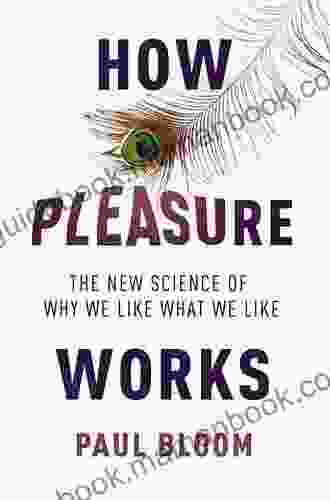The New Science of Why We Like What We Like

What makes you tick? What makes you laugh? What makes you cry? These are all questions that have puzzled philosophers and scientists for centuries. And while we may never have all the answers, new research is shedding light on the mysterious question of why we like what we like.
4.1 out of 5
| Language | : | English |
| File size | : | 475 KB |
| Text-to-Speech | : | Enabled |
| Screen Reader | : | Supported |
| Enhanced typesetting | : | Enabled |
| Word Wise | : | Enabled |
| Print length | : | 247 pages |
In the past, scientists have focused on the role of genetics in shaping our preferences. And while it's true that our genes play a role in everything from our physical appearance to our personality, they're not the only factor that influences our likes and dislikes.
Culture also plays a major role in shaping our preferences. The things we learn from our parents, our peers, and our community all influence what we like and don't like. For example, if you grow up in a culture that values art, you're more likely to appreciate art than someone who grows up in a culture that doesn't.
Our environment also plays a role in shaping our preferences. The things we see, hear, and experience all influence what we like and don't like. For example, if you live in a city, you're more likely to be exposed to different cultures and cuisines than someone who lives in a rural area.
Finally, our personality also plays a role in shaping our preferences. Extroverts tend to be more outgoing and social than introverts, and they're more likely to enjoy activities that involve other people. Introverts, on the other hand, tend to be more reserved and shy, and they're more likely to enjoy activities that they can do alone.
So, what does all this mean? It means that there is no one-size-fits-all answer to the question of why we like what we like. Our preferences are shaped by a complex interplay of genetics, culture, environment, and personality. By understanding these factors, we can learn more about ourselves and the people around us.
The Science of Aesthetics
The study of aesthetics is the branch of philosophy that deals with the nature of beauty and taste. Aesthetics is a field of philosophy that deals with the nature of beauty and taste, and it has been studied for centuries. One of the most important questions in aesthetics is: what makes something beautiful?
There are many different theories about what makes something beautiful. Some people believe that beauty is objective, meaning that there are certain qualities that make something beautiful regardless of the individual's opinion. Others believe that beauty is subjective, meaning that beauty is in the eye of the beholder.
There is no one right answer to the question of what makes something beautiful. However, there are some factors that have been shown to increase the likelihood that something will be perceived as beautiful. These factors include:
- Symmetry
- Order
- Balance
- Harmony
- Complexity
These factors are not always necessary for something to be beautiful, but they can certainly help. For example, a symmetrical face is often considered to be more beautiful than an asymmetrical face. A well-organized room is often considered to be more beautiful than a cluttered room. And a balanced composition is often considered to be more beautiful than an unbalanced composition.
Of course, beauty is in the eye of the beholder, and there is no one right answer to the question of what makes something beautiful. However, by understanding the factors that contribute to beauty, we can learn more about what makes us tick.
The Science of Music
Music is a universal language that has the power to move us in profound ways. It can make us laugh, cry, dance, and think. But what is it about music that makes it so powerful? And why do we like the music we like?
There is no one answer to these questions, but science has begun to shed light on the complex relationship between music and the human brain. Researchers have found that music can activate a wide range of brain regions, including those involved in emotion, memory, and reward.
One of the most important factors that influences our musical preferences is our brain's reward system. When we listen to music that we like, our brains release dopamine, a neurotransmitter that is associated with pleasure. This is why we often feel happy and relaxed when we listen to music.
Another factor that influences our musical preferences is our culture. The music we grow up with is often the music we continue to like as adults. This is because our brains are wired to prefer familiar sounds. So, if you grew up listening to classical music, you're more likely to enjoy classical music than someone who grew up listening to rock music.
Of course, there are many other factors that can influence our musical preferences, including our personality, our mood, and our experiences. But by understanding the science of music, we can learn more about what makes us tick.
The Science of Love
Love is one of the most powerful emotions that we can experience. It can make us feel happy, fulfilled, and connected to others. But what is love, and why do we fall in love with the people we do?
There is no one answer to these questions, but science has begun to shed light on the complex process of falling in love. Researchers have found that love is associated with a number of different brain regions, including those involved in reward, motivation, and attachment.
When we fall in love, our brains release a number of neurotransmitters, including dopamine, oxytocin, and serotonin. These neurotransmitters make us feel happy, bonded, and attached to our partner.
In addition to these neurotransmitters, love is also associated with a number of different hormones, including testosterone and estrogen. These hormones can influence our sexual desire, our mood, and our overall well-being.
Of course, love is a complex emotion, and it is influenced by a number of different factors, including our personality, our culture, and our experiences. But by understanding the science of love, we can learn more about what makes us tick.
The science of why we like what we like is a complex and fascinating field. By understanding the factors that influence our preferences, we can learn more about ourselves and the people around us. We can also use this knowledge to create more
4.1 out of 5
| Language | : | English |
| File size | : | 475 KB |
| Text-to-Speech | : | Enabled |
| Screen Reader | : | Supported |
| Enhanced typesetting | : | Enabled |
| Word Wise | : | Enabled |
| Print length | : | 247 pages |
Do you want to contribute by writing guest posts on this blog?
Please contact us and send us a resume of previous articles that you have written.
 Top Book
Top Book Novel
Novel Fiction
Fiction Nonfiction
Nonfiction Literature
Literature Paperback
Paperback Hardcover
Hardcover E-book
E-book Audiobook
Audiobook Bestseller
Bestseller Classic
Classic Mystery
Mystery Thriller
Thriller Romance
Romance Fantasy
Fantasy Science Fiction
Science Fiction Biography
Biography Memoir
Memoir Autobiography
Autobiography Poetry
Poetry Drama
Drama Historical Fiction
Historical Fiction Self-help
Self-help Young Adult
Young Adult Childrens Books
Childrens Books Graphic Novel
Graphic Novel Anthology
Anthology Series
Series Encyclopedia
Encyclopedia Reference
Reference Guidebook
Guidebook Textbook
Textbook Workbook
Workbook Journal
Journal Diary
Diary Manuscript
Manuscript Folio
Folio Pulp Fiction
Pulp Fiction Short Stories
Short Stories Fairy Tales
Fairy Tales Fables
Fables Mythology
Mythology Philosophy
Philosophy Religion
Religion Spirituality
Spirituality Essays
Essays Critique
Critique Commentary
Commentary Glossary
Glossary Bibliography
Bibliography Index
Index Table of Contents
Table of Contents Preface
Preface Introduction
Introduction Foreword
Foreword Afterword
Afterword Appendices
Appendices Annotations
Annotations Footnotes
Footnotes Epilogue
Epilogue Prologue
Prologue Stephanie E Jones Rogers
Stephanie E Jones Rogers Marc Cameron
Marc Cameron Raven Gulley
Raven Gulley Daniel Kucan
Daniel Kucan Claudia Vance
Claudia Vance Paul French
Paul French Tanya Markul
Tanya Markul Christina Bennett
Christina Bennett Bestwriters Club
Bestwriters Club Philip K Allan
Philip K Allan Laura Vanarendonk Baugh
Laura Vanarendonk Baugh Sam P Ridings
Sam P Ridings Alexander Phenix
Alexander Phenix Cosmas Inyang
Cosmas Inyang Tyler Merritt
Tyler Merritt Susan Srikant
Susan Srikant Roberta Edwards
Roberta Edwards Peter Brook
Peter Brook Timothy Collins
Timothy Collins Dr Marilyn Glenville Phd
Dr Marilyn Glenville Phd
Light bulbAdvertise smarter! Our strategic ad space ensures maximum exposure. Reserve your spot today!

 Duane KellyUnveiling the Strange and Mysterious World of Micro Baseball: Tales from the...
Duane KellyUnveiling the Strange and Mysterious World of Micro Baseball: Tales from the...
 Brady MitchellMarketing Fashion Second Edition: Strategy, Branding, and Promotion for the...
Brady MitchellMarketing Fashion Second Edition: Strategy, Branding, and Promotion for the... Russell MitchellFollow ·15.8k
Russell MitchellFollow ·15.8k Tyler NelsonFollow ·16.2k
Tyler NelsonFollow ·16.2k Ken FollettFollow ·5.9k
Ken FollettFollow ·5.9k Bryson HayesFollow ·10.7k
Bryson HayesFollow ·10.7k Lucas ReedFollow ·2k
Lucas ReedFollow ·2k Evan HayesFollow ·3.7k
Evan HayesFollow ·3.7k Nathaniel PowellFollow ·5.8k
Nathaniel PowellFollow ·5.8k Ken SimmonsFollow ·3.8k
Ken SimmonsFollow ·3.8k

 Leslie Carter
Leslie CarterWhat We Must Do Now To Save Reproductive Freedom
Roe v. Wade, the landmark...

 Cade Simmons
Cade SimmonsThe Unbreakable Bond: Unveiling the Connection Between...
In the realm of...

 Roy Bell
Roy BellFull Contact Chapter Five: The Final Chapter of the Hatch...
In this gripping to the Hatch saga, we...

 Fred Foster
Fred FosterUnveiling the Tale of the Genpei Wars: A Comprehensive...
Deep within the annals of Japanese history,...

 Jaden Cox
Jaden CoxFerguson in Black and White: A Profound Examination of...
The Ferguson tragedy, sparked by the fatal...
4.1 out of 5
| Language | : | English |
| File size | : | 475 KB |
| Text-to-Speech | : | Enabled |
| Screen Reader | : | Supported |
| Enhanced typesetting | : | Enabled |
| Word Wise | : | Enabled |
| Print length | : | 247 pages |










